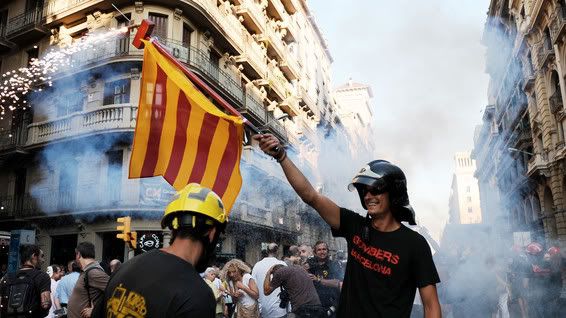With a hat tip to Reagrupament International, I've just read a remarkably well-informed article in the Financial Times on the economic situation in Spain, how it is being used by the Spanish government as a pretext for revisiting the automony of its autonomous communities, and the ramifications for Catalan and Basque independence.
Spain: Autonomy under fire
Tensions between indebted regions and central government are growing amid the euro crisis
Inflammatory talk: firemen in Barcelona protest against austerity measures.
The ruling Partido Popular has dropped hints about curbing the power regions
such as Catalonia acquired following Franco’s dictatorship
To read it, people will need to register; but we can read eight articles a month for free.



4 comments:
But isn't there a bigger story. Spain's undemocratic constitution?
This is a European state refuses to allow a constituent nation - nations which precede the formation of that state - from having a referendum on independence. Doesn't the UN charter allow the right to self-determination?
Does the centre-right Catalan nationalist party actually want independence though? It isn't in their current programme and they aren't pushing for it. Which begs the question, if not now, when?
I am aware there are numerous leftist parties advocating independence but they are much smaller than the centre-right.
Would appreciate someone setting it straight!
I'm not so sure that we can say Spain has a markedly "undemocratic" constitution compared with other countries, 14:06. Without going through a list, several countries regard their territory as permanently belonging to them. But the right to self-determination trumps whatever it says in any country's constitution.
The trickiest part of Spain's constitution is that it authorizes military force to maintain their territorial integrity. But I have to say that it is very hard to see Spain's military actually doing it. In the past, it probably could have happened in the case of Euskadi because of the history of violence there; and it still might, but it's harder to see it happen now. In the case of Catalunya, I think it simply could not happen. Not now that Spain is a part of the EU, and definitely while it is in hock to the EU to the extent it is now.
In Catalunya, Spain's weapon is economic. Catalunya is a rich country that could easily be independent; but it has a serious cash-flow problem because Spain collects taxes centrally and pays all the Autonomous Communities (except the Basque AC and Nafarroa) on a month-by-month basis. Every month, Catalunya is faced with the problem of whether the transfer will arrive on time, and the vast majority fo public sector workers won't get paid if it doesn't. In any stand off situation Madrid could simply cut off that cash flow and bring Catalunya to a halt.
If we accept the political reality that Spain will never willingly consent to Catalunya becoming independent, then the name of the came is to change the fiscal arrangements so that Catalunya collects its own taxes. Of course Spain won't willingly consent to that either, but if the Catalan Government sets up an alternative tax collection agency, and if it can persuade companies and individuals to pay their taxes to it rather than Madrid, Madrid will probably not be able to do anything to prevent it happening. Not so much a unilateral declaration of independence as a unilateral declaration of fiscal autonomy (that might make the title of a post). I think this best explains why CiU are putting fiscal autonomy before independence. 15:47. This article might help.
In fact, this is already happening. As we can read here, Diem Prou has been set up as a "civil disobedience" tax campaign sending the tax money they owe to the Catalan Government rather than Madrid. Perhaps it will take off. After all, the reason independence is now on the political agenda is largely because of similar small-scale citizens' initiatives that snowballed into something much bigger.
MH - thanks for that. I can't see Spain sending in the troops ... yet.
OK, I know it sounds alarmist, but things could change very quickly with the collapse of the Euro etc. After all, who'd have thought in 1960s Wilsonian Britain, with the Beatles and Flower Power that troops would be on the streets of Northern Ireland.
I'm not saying it will happen, but these things happen step by step and have a logic of their own.
I'm currently reading Robin Evans's Gwlad y Basg Yma o Hyd - Goroesiad Cenedl' which came out for the Eisteddfod (gwasg Carreg Gwalch, £7.50 http://www.carreg-gwalch.com/product/gwlad_y_basg_-_yma_o_hyd_/ ). It's an excellent little history of the Basque Country. Actually, the best and most informative I've read which should be translated into English (and keep the Welsh references which are in it too!). I noted that Aguierre, the Basque Prime Minister at the time of the Civil War was organised enough to dispand the Guardia Civil in time and so denied Franco a ready network of occupying force. In that respect, Pujol's formation of the Catalan Mossos police could be highly significant. http://en.wikipedia.org/wiki/Mossos_d'Esquadra
M.
Post a Comment